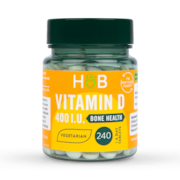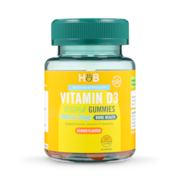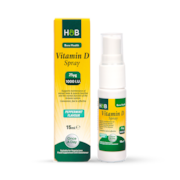20% off €35
Code:EXTRA20
What does vitamin D do? An ultimate guide to its benefits

Feeling tired, run-down or low on energy? A lack of vitamin D could be the cause. Discover why the sunshine vit is key to keeping your bones, muscles and immune system happy
Our top picks
10µg of D3

Holland & Barrett
Holland & Barrett Vitamin D3 400 I.U. 10ug 240 Tablets
Buy 1 Get 1 Free
€7.09
Vegan gummies

Holland & Barrett
Holland & Barrett Vegan Vitamin D 1000 I.U 25ug 30 Gummies
Buy 1 Get 1 Free
€7.79
Peppermint spray

Holland & Barrett
Holland & Barrett Vitamin D Spray 1000 I.U 25ug Peppermint Flavour 15ml
Buy 1 Get 1 Free
€9.09
You’ve probably heard that vitamin D is essential for strong bones and a healthy immune system. But did you know it’s actually a hormone? Yep, things just got more interesting.1
Known as the ‘sunshine vitamin’, it’s made mostly by your body when your skin is exposed to direct sunlight – around 90% of what you need, in fact.
However, a not-so-sunny one in six adults and nearly 20% of children in the UK aren’t getting enough vitamin D.2
Older adults, people who spend most of their time indoors and those from Black and South Asian backgrounds are especially likely to have lower levels, making it even more important to stay on top of your intake.2,3
Well, we’re here to shine a light on this essential nutrient and explain why catching some rays (safely!) might be more important than you think.
What does vitamin D actually do in my body?
This little powerhouse does a lot more than just keep your bones in check (though it’s pretty amazing at that too). It’s also a big player in keeping your immune system running smoothly, like the behind-the-scenes crew that makes sure the show runs without a hitch.
Now, here’s the tricky part: most of your vitamin D actually comes from sunlight hitting your skin. Great news in July (usually…), not so great when it’s grey and gloomy. That’s why a daily vitamin D3 supplement (the same type our body’s make from the sun) is recommended by the NHS, especially during the darker months.
And what’s more, studies suggest that vitamin D can influence and regulate your immune system – giving it a bit of extra backup.4
Vitamin D benefits
Your bones’ best friend. Vitamin D makes it easier for your body to soak up calcium from food – super important for keeping your skeleton strong and sturdy. Without it, calcium can’t do its job. And that’s not all… It teams up with phosphate as well to support healthy teeth and muscles.5
And vitamin D not only maintains normal bone function, but getting enough of it can also help support the normal growth and development of bones in children. It's not just about fixing what's there, it’s about futureproofing, too.
Imagine your immune system as a highly trained army, always on the lookout for invaders like bacteria and viruses. Now, picture vitamin D as the general who ensures this army is well-equipped and ready for action.6
Vit D is a key player in immune regulation, supporting the proper function and balance of immune cells. Ensuring adequate vitamin D levels can be a simple yet effective way to maintain a healthy immune system.4,7
Head over to 3 ways to support your immune system for more tips and tricks.
Vitamin D is key to supporting your muscles and keeping them functioning well. Adequate levels of vit D are linked to better muscle function and performance. It can also directly affect muscle cells, influencing processes like muscle contraction and regeneration.8-11
What’s more is that vitamin D can help reduce the risk of falling associated with postural instability and muscle weakness too.12-14
How does sunlight give us vitamin D?
When sunlight hits your skin, your body starts making a form of vitamin D called cholecalciferol. From there, your liver and kidneys do some behind-the-scenes work to turn it into its active form, known as calcitriol. This is the version your doctor checks when testing your vitamin D levels.15
In the sunnier months, your body can actually make more vitamin D than it needs. But don’t worry – it doesn’t go to waste. The extra gets tucked away in your body fat, ready to be used when sunshine is harder to come by.16
So when the sun’s out, try to soak up a little – it really does make a difference.
What are the symptoms of a vitamin D deficiency?
Not getting enough vitamin D can lead to serious bone problems. In children, it can cause rickets, a condition that makes their bones soft and can lead to deformities. In adults, low vitamin D can lead to osteomalacia or even osteoporosis, both of which make bones weaker and more likely to break. So keeping your vitamin D levels up is really important for strong, healthy bones at any age.5,17
Curious about what causes vitamin D deficiency or what signs to look out for? Check out our full article on vitamin D deficiency to get all the details.
Though it’s worth remembering that while maintaining healthy vitamin D levels is important, it's always best to speak to a healthcare professional before starting any supplement, as individual needs can vary and supplements are not a guaranteed solution for preventing or treating these conditions.
How much vitamin D do I need?
From March to the end of September, the sun’s got your back. Most of us can absorb all the vitamin D we need just by getting a bit of sunshine.
Children from the age of one year and adults need 10 micrograms (mcg) of vitamin D a day. This includes pregnant and breastfeeding women, and people at risk of vitamin D deficiency.17 Even newborns need vitamin D, and your doctor will often provide this.
Though if your baby is drinking more than 500ml (about a pint) of infant formula a day, you can usually skip the vitamin D drops for now. Why? Because their formula is already fortified with enough vitamin D.18
But if you're breastfeeding and live in the UK, the NHS recommends that even if you're taking a vitamin D supplement yourself, your little one still needs their own daily vit D support from birth, like these drops.18
Want to learn more? Check out our easy-to-follow guide on vitamin D for children and babies.
Do I need to take a vitamin D supplement when I’m pregnant?
When you're pregnant, topping up your vitamin D isn't just good for you – it's good for your baby too. It helps keep your immune system healthy and supports your baby's development from the very beginning.
Baby on the way? Head over to vitamin D for pregnancy to help ‘bump’ up your levels.
Our favourite vitamin D supplements
Vitamin D3 is a powerhouse nutrient that helps support your immune system, keeps your bones and muscles strong, and aids in the absorption of calcium and phosphorus. While our bodies make it naturally from sunlight, that’s not always easy to come by – especially during the darker months.
That’s why experts recommend everyone over the age of one takes at least 10µg of vitamin D daily. So whether it’s cloudy skies or busy schedules keeping you indoors, a daily dose of vitamin D3 can help top up your levels all year round.
All you need to do is simply take one tablet daily, preferably with a meal.
Let’s be honest, swallowing tablets isn’t everyone’s cup of tea. Luckily, our fruity, chewable gummies are an easy (and delicious) way to get your daily dose of vitamin D – no water, no pills, just a tasty gummy that’s totally vegan.
We know that sun = vit D… BUT here in the UK getting enough sun can be tricky. That’s why the NHS recommends taking a vitamin D supplement during the colder months.
Whether you’re plant-based or just prefer gummies to tablets, these vegan-friendly vit D gummies are a simple, tasty way to keep your levels topped up daily – whatever the weather.
Sunshine in a spray – and with a minty taste too.
This clever little product doesn’t just taste good, it also helps keep your bones and muscles doing their thing, and gives your immune system a well-deserved high five.
And the best part? You don’t need to swallow any pills or mix any powders. Just a quick spritz under the tongue and you're good to go.
Fuss-free and super effective – this is your daily ‘sunshine vitamin’ shortcut, whatever the weather is doing outside.
The final say
So whether you’re soaking up the sun, loading your plate with vitamin D-rich foods or popping a daily supplement, there are plenty of ways to give your body the support it needs.
This small but mighty vitamin does a lot behind the scenes – from supporting strong bones to keeping your immune system fighting fit. However you get your daily vit D, your body will thank you for it.
Inspired and wanting more? Take a look at some other daily essentials and wellness regulars your body will love.
This article provides informational advice and is not a substitute for medical care. Curated by experts for accuracy, we take great care to ensure the information is up-to-date and relevant. However, you should always consult your GP or healthcare professional before using supplements or alternative products, particularly if you have medical conditions or are under supervision.
1. Ellison DL, Moran HR. Vitamin D. Nursing Clinics of North America. 2021 Mar;56(1):47–57.
2. Department of Health and Social Care. New review launched into vitamin D intake to help tackle health disparities [Internet]. GOV.UK. 2022. Available from: https://www.gov.uk/government/news/new-review-launched-into-vitamin-d-intake-to-help-tackle-health-disparities
3. Vitamin D deficiency: migrant health guide [Internet]. GOV.UK. Available from: https://www.gov.uk/guidance/vitamin-d-deficiency-migrant-health-guide
4. Aranow C. Vitamin D and the Immune System. Journal of investigative medicine : the official publication of the American Federation for Clinical Research [Internet]. 2011 Aug;59(6):881. Available from: https://www.ncbi.nlm.nih.gov/pmc/articles/PMC3166406/
5. NHS. Vitamin D - Vitamins and Minerals [Internet]. NHS. 2020. Available from: https://www.nhs.uk/conditions/vitamins-and-minerals/vitamin-d/
6. Amirhossein Ghaseminejad-Raeini, Ghaderi A, Sharafi A, Behrad Nematollahi-Sani, Moossavi M, Afshin Derakhshani, et al. Immunomodulatory actions of vitamin D in various immune-related disorders: a comprehensive review. Frontiers in Immunology [Internet]. 2023 Jul 14;14. Available from: https://www.ncbi.nlm.nih.gov/pmc/articles/PMC10379649/
7. Gholamreza Daryabor, Nasser Gholijani, Fatemeh Rezaei Kahmini. A review of the critical role of vitamin D axis on the immune system. Experimental and Molecular Pathology. 2023 Aug 1;132-133:104866–6.
8. Agoncillo M, Yu J, Gunton JE. The Role of Vitamin D in Skeletal Muscle Repair and Regeneration in Animal Models and Humans: A Systematic Review. Nutrients. 2023 Oct 16;15(20):4377–7.
9. Rejnmark L. Effects of vitamin D on muscle function and performance: a review of evidence from randomized controlled trials. Therapeutic Advances in Chronic Disease [Internet]. 2010 Sep 7;2(1):25–37. Available from: https://www.ncbi.nlm.nih.gov/pmc/articles/PMC3513873/
10. Kuwabara A, Matsumoto M, Yoichi Hatamoto, Fujita S. Vitamin D and muscle health: insights from recent studies. Current Opinion in Clinical Nutrition & Metabolic Care. 2024 Sep 5;
11. Gunton JE, Girgis CM. Vitamin D and muscle. Bone Reports. 2018 Jun;8:163–7.
12. Ceglia L. Vitamin D and its role in skeletal muscle. Current Opinion in Clinical Nutrition and Metabolic Care. 2009 Nov;12(6):628–33.
13. Vitamin D and risk of falling [Internet]. European Food Safety Authority. 2011 [cited 2025 May 28]. Available from: https://www.efsa.europa.eu/en/efsajournal/pub/2382
14. Wei FL, Li T, Gao QY, Huang Y, Zhou CP, Wang W, et al. Association Between Vitamin D Supplementation and Fall Prevention. Frontiers in Endocrinology. 2022 Aug 10;13.
15. National Research Council (US) Committee on Diet and Health. Fat-Soluble Vitamins [Internet]. Nih.gov. National Academies Press (US); 2016. Available from: https://www.ncbi.nlm.nih.gov/books/NBK218749/
16. Vitamins and minerals [Internet]. www.nhsinform.scot. Available from: https://www.nhsinform.scot/healthy-living/food-and-nutrition/eating-well/vitamins-and-minerals/#vitamins
17. Office of Dietary Supplements - Vitamin D [Internet]. ods.od.nih.gov. Available from: https://ods.od.nih.gov/factsheets/VitaminD-HealthProfessional/#h9
18. NHS. Vitamins for children [Internet]. nhs.uk. 2020. Available from: https://www.nhs.uk/baby/weaning-and-feeding/vitamins-for-children/







